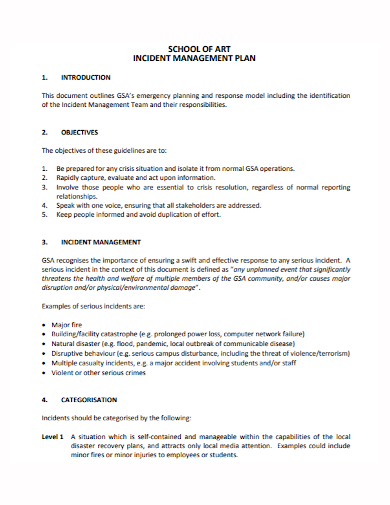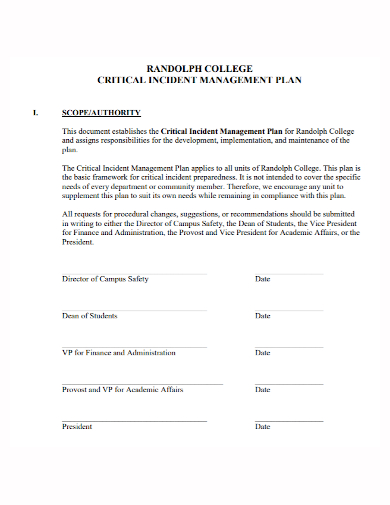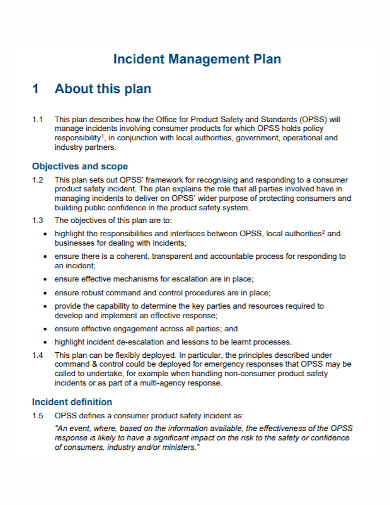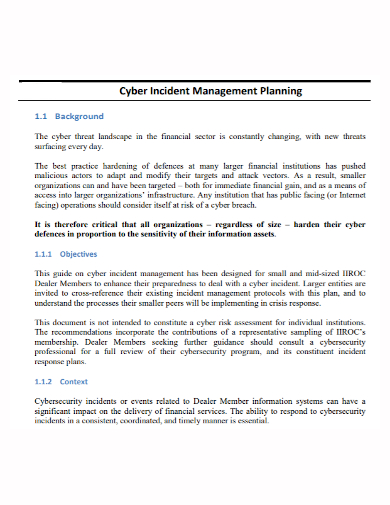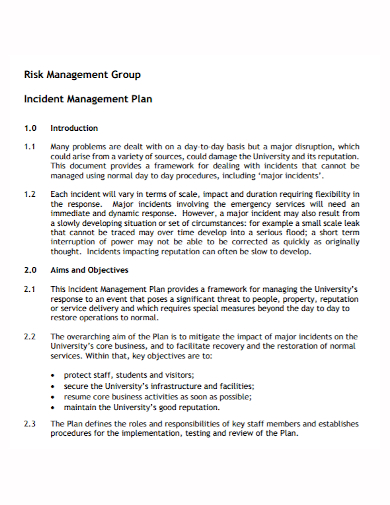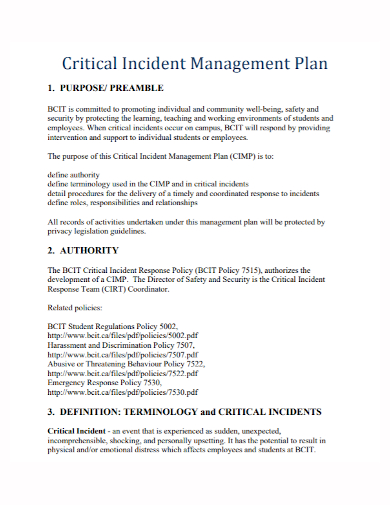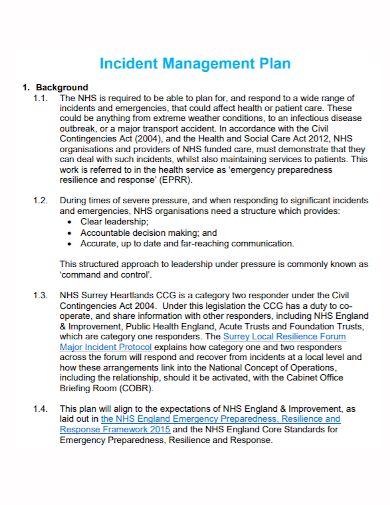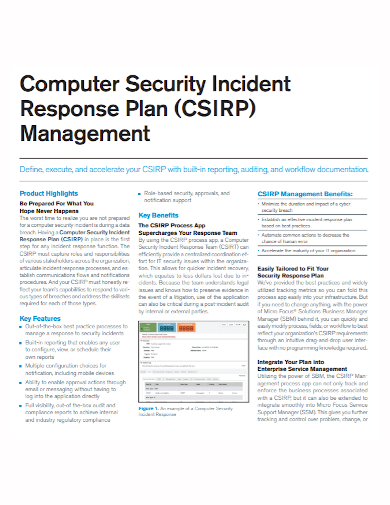Incidents that happen within a business organization can happen anytime, mostly without warning. So organizations should expect that incidents are part of everyday lives and that advance preparation is the key to help lessen its negative impact. When left unprepared, operations would be disrupted, resources compromised, financial damage and many more. In order to address such issues calls for an incident management plan. With such plan, organizations are able to identify weaknesses in a business, mitigate the impact of a variety of situations, and limit damage to an organization’s reputation, finances and operations. Read more about this in our article below and if you want to get started developing your plan, check out our free incident management plan samples for your perusal.
10+ Incident Management Plan Samples
1. Incident Management Plan Template
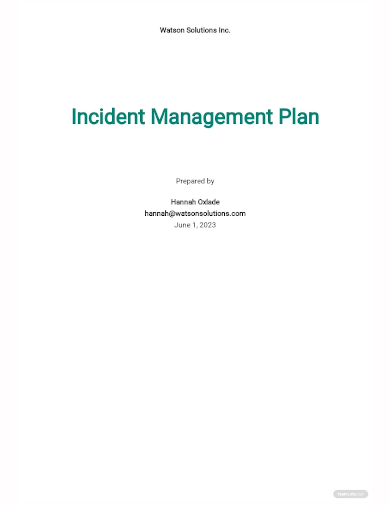
2. Security Incident Management Plan Template
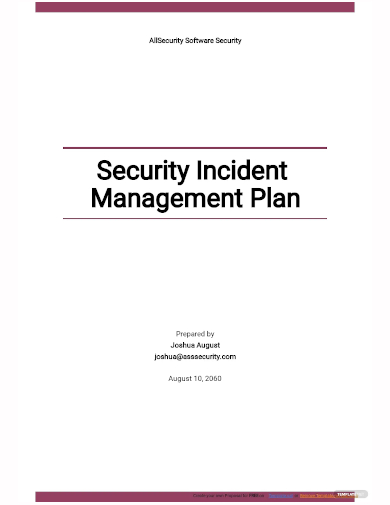
3. Incident Management Communication Plan Template
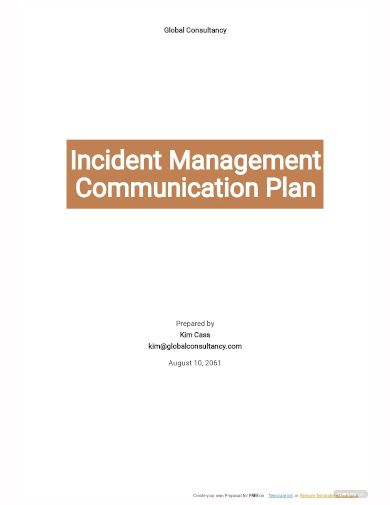
4. School Incident Management Plan
5. Critical Incident Management Plan
6. Sample Incident Management Plan
7. Cyber Incident Management Plan
8. Risk Incident Management Plan
9. Standard Incident Management Plan
10. Basic Incident Management Plan
11. Incident Management Response Plan
What Is an Incident Management Plan?
When running an organization, it should be anticipated that any sort of damaging incidents can occur within the company. Planning ahead may not fully deflect such, but it can help prevent this from happening or minimize its adverse impact. An incident management plan should be able to establish procedures and actions that can help organizations return to normal as quickly as possible following an unplanned event. The plan will be able to identify how incidents are detected and communicated, who is responsible, what tools are used, and what steps are taken to resolve the incident. By having a incident management plan, this is how organizations response to their business continuity management. Exposure to threat is real and unavoidable this is how company should try to manage and stay afloat.
How To Develop an Incident Management Plan?
An incident management plan is applicable in all sorts of industries, and are most important to bigger and complex businesses. Incidents can be anything from IT system failure, to events requiring the attention of healthcare professionals, to critical maintenance of physical infrastructure. Considering this all these would create a negative impact on a company, incident management is crucial. With such faster responses help reduce the overall impact of incidents, mitigate damages, and ensure that systems and services continue to operate as planned. To develop an incident management plan, here are several factors you should consider:
I. Recognizing and Identifying the Incident
Incidents are often identified through staff reports and solution analysis. Once understood and recognized, the incident is categorize so an incident investigation can begin. Categorization is important to determining how incidents should be handled and for prioritizing response resources.
II. Situation Assessment
By assessing the situation, the incident management team will be able to piece together what needs to be done and come up with solutions in order to solve or tackle the situation. You will need to create certain procedures how to assess different types of situations that can create a negative impact on the company.
III. Incident Notification & Escalation
Incident notification mean notifying the people who are indirectly and directly affected. There should be a process on how to do so, and to whom should this be escalated to.
IV. Organize a Response Team
A proper response team should be organized as they should be fully aware of the incident management plan and activates it when necessary and designates tasks for recovery. Aside from that they should focus on identifying potentially dangerous situations, while the operations team ensures the organization follows the plan’s actions correctly. The team should have a liaison who deals with outside organizations and another member who specifically handles media.
V. Proper Training And Communication
Aside from training the incident response team, it is best to also include other employees, since being aware on how to identify and report incidents, your the team can respond faster and need to spend less time interpreting reports. Establishing effective communication is critical to team collaboration and effectiveness. One way to protect and ensure communication is to create guidelines. These guidelines can specify what channels staff should use, what content is expected in those channels, and how communications should be documented.
VI. Analyzing and Recovery
After investigation and analyzing the incident, you can determine the appropriate remediation steps. This includes notifying any relevant staff, customers, or authorities about the incident and any expected disruption of services.
VII. Resolution and Closure
This should involve eliminating all existing threats and restoring all systems to full function. Depending on incident type or severity, this may require multiple stages to ensure that incidents don’t reoccur. Closing incidents typically involves finalizing documentation and evaluating the steps taken during response. This evaluation helps teams identify areas of improvement and proactive measures that can help prevent future incidents.
FAQs
What Do Incident Response Team Do?
These group of individuals are responsible for developing a proactive incident response plan, testing for and resolving system vulnerabilities, maintaining strong security best practices and providing support for all incident handling measures.
What Is Business Continuity Plan?
This is a document that outlines the potential impact of disaster situations, creates policies to respond to them and helps businesses recover quickly so they can function as usual.
What Is the Importance Of Incident Management?
The internal system of a company is an essential aspect in business operations. Once compromised, it can lead to major losses and dire consequences. With incident management, you will be able restore services back to normal operation as fast as possible and mitigate the adverse effect of critical incidences on business operations.
Make sure to come up with an efficient and well-defined incident management plan, so whenever unplanned events occur your company will be able to addressed these issues effectively and swiftly.
Related Posts
FREE 10+ Child Care Risk Management Plan Samples
FREE 10+ Stakeholder Management Plan Samples
FREE 9+ Cost Management Plan Samples
FREE 14+ Schedule Management Plan Samples
FREE 10+ Traffic Management Plan Samples
FREE 10+ Sample Risk Management Plan
FREE 9+ Human Resources Management Plan Samples
FREE 8+ Requirements Management Plan Samples
FREE 8+ Program Management Plan Samples
FREE 5+ Procurement Management Plan Samples
FREE 17+ Construction Management Plan Samples
FREE 15+ Asset Management Plan Samples
FREE 15+ Sample Project Management Plan
FREE 10+ Scope Management Plan Samples
FREE 10+ Transport Management Plan Templates

